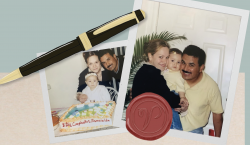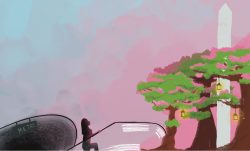“Excuse me, is this your child?” the waiter asked. We must have been an odd sight—an American couple dining at a Dallas family restaurant with what appeared to be a gangly six-year-old Brit. After being assured that I was not, in fact, the victim of an elaborate trans-Atlantic kidnapping scheme and that we had just lived abroad for a while, he left us alone without informing the police.
In Sept. 1990, I called my mother “mum” and found cucumber and butter sandwiches strangely delicious (I still do). We left Bahrain in a whirlwind, barely throwing our clothing into suitcases. I remember watching Iraqi troops invade Kuwait on the BBC, barely 200 miles away from where I was.
Moving to Houston was an experience. After spending over half my life in a Muslim country, the shift from Bahrain to American suburbia was shocking. The elementary school I attended seemed to exist for the sole purpose of indoctrinating young Texans. I was bombarded by an endless flow of square dancing, “Go Texan” Days, and tales of the Alamo (which aren’t that captivating the first time). How could they expect such a worldly, cultured child to participate in such things? So what if Texas had been its own country for a few years? It hadn’t managed to stay that way, so there isn’t really much to brag about now, is there?
People do not come to Houston for its beauty or charm; the lure has always been money. Concrete, oil refineries and endless sprawl have gradually replaced the swampland. Air conditioning is the only thing that makes the hot, sticky summer air somewhat tolerable. Lacking any form of mass transit, people move from one air-conditioned bubble to another over a vast and confusing freeway system. Houston holds the coveted distinctions of being both America’s fattest and most polluted city.
As young as eight years old, I adopted a decidedly anti-Texan stance. I was different. I had seen the world. A sketchy Persian rug dealer had offered my parents four rugs in exchange for my companionship. How many of my peers could boast almost being sold into white slavery? Looking back, I think my wholesale rejection of all things Texan stemmed from my desire to distinguish myself from the stereotypical Texan: an arrogant, brash, cowboy boot-clad individual, convinced of their own superior nature. But my rejection itself was inherently arrogant.
When I began my college search, leaving Texas was the most important thing to me. Somehow, I got away with applying to only one in-state school. My father still teases me for ending up going to school below the Mason-Dixon line after the fuss I made about leaving the South behind.
In my first few months here, I would usually say I was from Houston, without mentioning the state. “I reject my Southern heritage” became another staple of my repartee. I wondered how I could obtain a D.C. identification card, and when I could start saying I was from Washington, D.C. (an attitude which thoroughly irritated my friends from home, I now know.)
On Feb. 1, I found myself connecting to my state and city in a way I never thought possible. Houston’s darling is the space industry. Located only seven miles from my childhood home, NASA means everything to the surrounding community. Trips to “Space Center Houston,” complete with freeze-dried ice cream sandwiches, were cornerstones of my childhood. I babysat for an astronaut’s kids, and my friend’s dad even repaired the Hubble telescope. Growing up, the Challenger disaster represented the tragic twisting of the promise and hope of space flight. As the whole nation grieves, the pain felt in my community is unquantifiable.
That Saturday morning, when I heard about the tragedy, I frantically searched for the names of those onboard, hoping there was no one I knew. A wave of selfish relief rolled over me when I realized no one I knew was on this mission. Still, something about this particular tragedy left me with profound emptiness.
Watching the images of Johnson Space Center flash across the TV screen, that white blur across the sky, the dazed NASA employees stumbling about Mission Control, I admitted something to myself I’ve been evading for years: I am a Texan. While you shouldn’t expect me to don a Stetson or start saying “y’all,” I accept this truth; I can no longer pretend to be Bahraini or British or anything else. Texas is more than the sum of its stereotypes. While I seriously doubt I will end up in Houston, I can’t deny its grasp on me.
Sonia Smith is a first-year in the School of Foreign Service and assistant leisure editor of the Georgetown Voice. Chances are you can’t be her car pelican.




